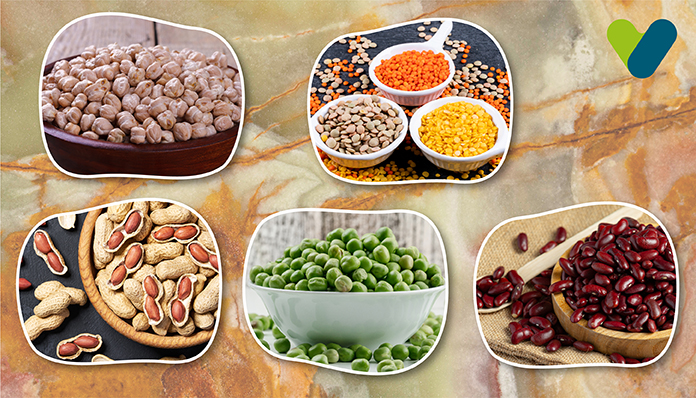Shreya has always wanted to consume delicious and zesty meals made with great kitchen spices as a big foodie. However, having recently delivered her baby, and her meals are confined to home-cooked food, made with only a handful of ingredients.
Consequent to her pregnancy, Shreya has also grown conscious of her weight and wants to take this time to eat meals that help her to shed the weight but also feel tasty. She recently read in a magazine about the excellent health benefits of beans and legumes for weight loss but feels unsure about the variety she can consume.
Today, the consumption of beans and legumes for weight loss is quite common as studies have shown that they offer a rich source of dietary fiber, proteins, and vitamin B. They also provide several health benefits, including reducing cholesterol levels, blood sugar levels, and enhanced performance of healthy gut bacteria.
There is a healthy variety of beans and legumes for weight loss for people like Shreya that they can consume and plan their meals accordingly. Let us take a look at a few of them.
Chickpeas
Loaded with fiber and protein, chickpeas are great for those who want to lose weight. It is an excellent replacement for red meat in the diet and mitigates the risk of heart diseases. Studies show that a single cup of chickpeas roughly contains 269 calories, 14.5 gm protein, 12.5 gm fiber, folate, manganese, copper, and iron.Eating chickpeas can positively affect blood sugar levels and increase insulin sensitivity. They can also help decrease the levels of bad cholesterol in the body and enhance gut health.
Lentils
In a vegetarian diet, lentils are among the best source of beans and legumes for weight loss and protein. A single cup of lentils provides 18 gm of proteins, 16 gm of fiber, and 230 calories along with folate, manganese, copper, and Vitamin B1. This can help control blood sugar levels and reduce the level of bad cholesterol in the body.Peas
Rich in Vitamin K and folate, peas are an abundant source of fiber and protein, reducing insulin resistance and leaving you feeling fuller after a meal. Peas can further stimulate the growth of healthy bacteria in the intestines.Kidney Beans
With equal measures of protein and fiber, along with folate, manganese, copper, and iron, kidney beans help reduce body weight and fat mass in the body. They reduce the absorption of blood sugar in the body after consumption which keeps the levels under check.Black Beans
Similar in nutrition to kidney beans, black beans limit the absorption of sugar in the blood after meals, which keeps a check on diabetes and manages weight gain. As compared to many other foods that are high in carbohydrates, they have a low glycemic index.Soybeans
The most common form of soybean is tofu, while there are many other varieties of soybeans. Abundantly rich in proteins, fibers, manganese, iron, phosphorus, Vitamin K, Riboflavin, and folate, soybeans are also rich in antioxidants which limit the risk of heart diseases and enhance bone density levels during menopause in women.Peanuts
It might be surprising to know that peanuts are also a type of beans and legumes for weight loss. They are an excellent source of polyunsaturated fats, proteins, monounsaturated fats, and Vitamin B. This makes them suitable for heart health and healthy addition to the diet as a snack.Ideal for Weight Loss
Are you wondering what makes beans and legumes ideal for a weight loss diet? Well, here are some answers to the question.1. You will feel fuller for longer: Even the best meat preparations cannot keep you feeling fuller for longer, as compared to beans and legumes. They are essentially low in fat content but high on proteins. The unique nutritional content of these items helps to curb your food cravings. As a result, you will eat fewer snacks, which will help avoid those extra calories that you would have consumed through extra snacks.
2. Burns fats and calories: Since beans and legumes are highly rich in proteins, they can actively contribute to weight loss by torching the extra calories and fats in the body. The amino acids found in them can help limit the absorption of calories in the body as well.
3. Better results at weight loss: Consuming a diet rich in proteins and fiber, which comes from beans and legumes, can enhance weight loss in the body and at a better pace than a low-carb diet. At the same time, they can also take care of your heart health and reduce harmful cholesterol levels in the body.
There are multiple ways you can easily add beans and legumes for weight loss to your diet. Here are some fantastic ways to binge on more of these throughout the day.
- Consider making a soup, stew, or casserole using legumes.
- Make dips and spreads using pureed beans.
- Make a salad out of a handful of chickpeas and black beans by adding raw vegetables to the mix.
- Make a burger using cooked beans.
- Instead of binging on chips and crackers, consider eating more soy nuts and peanuts.
So, What Is the Bottom Line About Consuming Beans and Legumes for Weight Loss?
Given the large variety of beans and legumes that are available for consumption in your daily routine, you will have no problem choosing a few of them and adding them to your meals. There are multiple ways to add them to your regular meals and consume them regularly for effective weight loss.Given the number of benefits that beans and legumes bring to your body, it is expected that your body will react very positively to their consumption, which will get the intended weight loss benefits to your body in no time.
Remember to soak your beans and legumes before consumption which makes it easier to prepare them and very easy to digest.


